The ’80s sci-fi comedy, a sub-sub genre that defined my childhood (for better or worse) with films like Back to the Future and Real Genius, is alive and well in 2016. So far this year, we’ve seen the Ghostbusters reboot, as well as the more comical elements of Stranger Things (which includes an obligatory makeover montage!). Meanwhile, another edition of Guardians of the Galaxy is on the way, a follow-up to a film that dialed the nostalgia up to eleven.
No doubt the genre, in its earliest days, cashed in on the success of the Star Wars movies, combining new special effects with the increasingly raunchy humor of teen comedies. The Reagan years provided a useful foil for the subversive, underdog heroes, with government agents and evil corporations often cast as the villains—though I suppose the original Ghostbusters compromised slightly on this theme by making the bad guy a representative of the EPA. At the same time, the genre brought out some of the worst tendencies of the era. Weird Science, a film in which two horny losers build the “perfect” woman, is even more troubling than you remember. Monster Squad has not aged well, either, thanks in part to its use of a certain epithet common in the ’80s but mercifully going out of style today. And let’s agree not to talk about Howard the Duck.
Firmly perched in the genre, but mostly free of the baggage, is the underappreciated Innerspace, directed by Joe Dante (Gremlins, Explorers).
[Note: Spoilers Ahead. Like many great ’80s films, Innerspace has a trailer voiced by Don “In a World” LaFontaine, in case you need a refresher.]
I can’t think of another movie that succeeds at stuffing so many disparate concepts into a single narrative: crime caper, love story, space adventure, slapstick, corporate thriller. I giggle every time I explain the premise: hotshot pilot Tuck Pendleton (Dennis Quaid) is selected for a secret mission in which he will test fly a pod that can be miniaturized and injected into a host organism—much like Isaac Asimov’s Fantastic Voyage. But when some evil thugs break up the experiment and steal the technology, Tuck gets accidentally injected into Jack Putter (Martin Short), a nervous, hypochondriac grocery clerk. With Tuck’s voice in his head, Jack has to figure out how to get out of this mess before the bad guys find him, and before the pod’s supply of oxygen runs out.
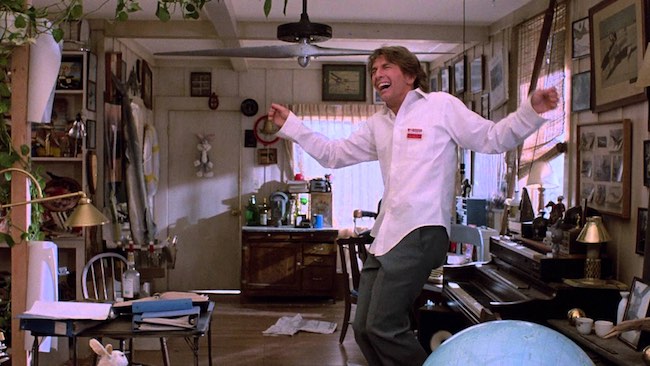
The perfect casting pits Quaid’s charm against Short’s manic silliness, making this a wonderful buddy movie (only with one of the buddies essentially haunting the other). Quaid makes the most of the static scenes in which he’s simply sitting in the pod, cracking jokes about Short’s digestive tract. Short, meanwhile, sometimes goes overboard with the physical comedy, an art form that has not fared well in the twenty-first century. Still, there are more subtle moments worth watching. The look on Short’s face when his captors suggest re-enlarging the pod while it’s still inside him is priceless. (“Have you any idea the kind of mess that would make?” one of them asks.)
Many viewers fell in love with Meg Ryan in the role of Lydia, a reporter who has recently broken up with Tuck. (Quaid really did fall in love with her—they were married a few years later.) Though the film leaves her offscreen for a large chunk of time, the script gives Lydia the opportunity to rescue someone (twice, in fact), rather than waiting to be rescued. And her clumsy use of a handgun makes me wonder why Ryan wasn’t cast in more slapstick comedies after this film. She’s hilarious.
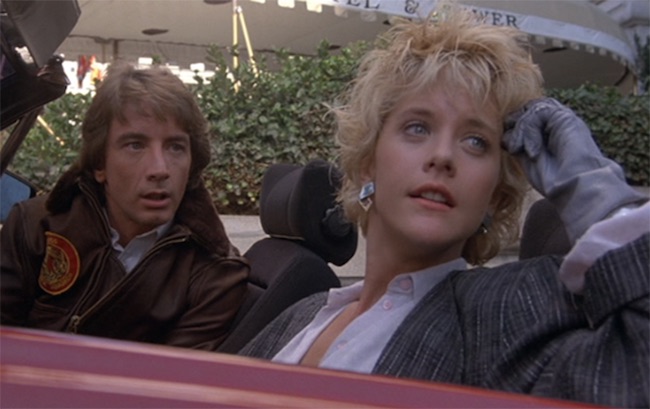
The filmmakers made use of other actors familiar to science fiction. Robert Picardo, the Doctor on Star Trek: Voyager, shows up as the creepy smuggler known as the Cowboy. Vernon Wells (The Road Warrior, Commando) plays the Terminator-like Mr. Igoe, while the great Kevin McCarthy (Invasion of the Body Snatchers) is Scrimshaw, the poor man’s Lex Luthor who is trying to steal the secrets of miniaturization. In one crazy scene, a puppet version of McCarthy wrestles with Short in a speeding car; a stunt that my brother and I would watch over and over, laughing hysterically. Even legendary animator Chuck Jones makes a cameo—fitting, given the cartoonish tone to the movie. The pod, I should point out, sounds like the Looney Toons’ Tasmanian devil when it revs up.
Puppet McCarthy notwithstanding, the special effects hold up today, and they won a well-deserved Oscar for their depiction the human body as an alien landscape. Jerry Goldsmith’s score is spectacular, as always, and the music of Sam Cooke is used to great effect. At the same time, the background of the film adds texture to the story. The lab where Tuck gets miniaturized has a clunky, cluttered look, with papers and gadgets strewn about, almost like a nerdy teenager’s bedroom or a high school AV club. Scrimshaw’s lab, on the other hand, features gleaming white walls, with sleek, modern equipment that hums like the bridge of the Enterprise. This contrast plays out in the climactic battle between Igoe’s menacing spacesuit and Tuck’s scrappy little pod, which resembles a harmless bumblebee in comparison. Dante also ruthlessly satirizes Jack’s boring life, dressing him in his Safeway uniform for most of the film, and later placing him in a doctor’s office with a cheesy painting of a beach on the wall. Later, when we see Jack wearing Tuck’s leather jacket, or pursuing the Cowboy in a glitzy nightclub, we begin to witness the change taking place in him.
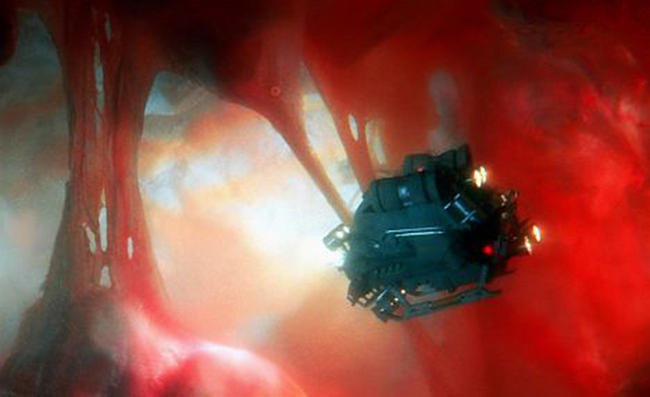
That, I think, is what separates Innerspace from other films of the era. One of the odd things about Ghostbusters and Back to the Future in particular is that the main characters don’t actually change—there is no arc, as the creative writing people like to say. Marty McFly and Peter Venkman begin as confident oddballs, they have their adventures, and then they continue on as confident oddballs. Which is fine—part of the appeal of those movies is that we want to be like those guys. But Innerspace is telling a different story, in which an unlikely friendship permanently alters the participants. Tuck’s good-natured attempts to get Jack to be brave feel authentic and even heartwarming. “You’re not the same man you were this morning,” Tuck says at one point. “You’re not gonna bag groceries all your life, are ya, Jack?” As the story unfolds, Putter discovers that he’s even stronger than he thought—with or without Tuck coaching him. At the same time, Jack tries to point Tuck in a better direction. In a genuinely well-acted scene, Jack angrily tells him that Lydia deserves someone better—right before he starts punching his own body, shouting, “Where are you?”
Granted, Jack’s newfound chutzpah gets a little weird, especially when it leads to an awkward, out-of-left-field kiss with Lydia that muddles the plot. But I’m quibbling. Tuck helps Jack find his true potential without the script descending into schmaltz, and that’s a special thing. At the end, when the two men finally meet, the bond between them is real. (Actually, it reminds me of when John McClane finally comes face-to-face with Al Powell in Die Hard.)
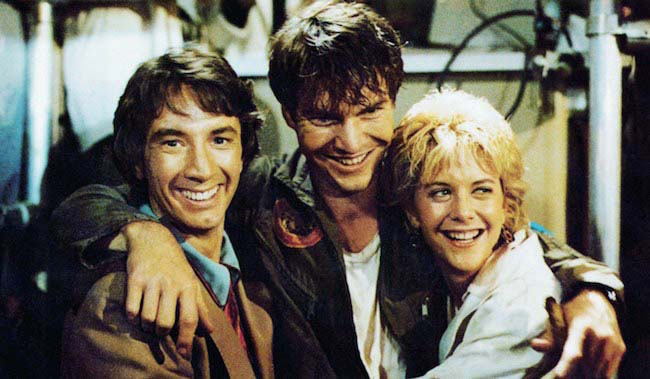
Even better is the closing shot of the movie. As the credits roll, and Rod Stewart sings a cover of “Twistin’ the Night Away” (you can see Martin Short hamming it up with Stewart in the video for the song, here), the camera follows Jack as he drives along the California coastline, pursuing Tuck and Lydia on another crazy adventure. Every time I watch the movie, I sit though the entire four-minute sequence, and I always feel a little sad when the cars are too far away to see, and the image at last fades out. Even though we never got to see the new and improved Jack in a sequel, I’m grateful for the journey. Where else but a sci-fi comedy can you find such hope in the ridiculous?
Robert Repino (@Repino1) grew up in Drexel Hill, Pennsylvania. After serving in the Peace Corps in Grenada, he earned an MFA in Creative Writing at Emerson College. He is the author of Mort(e) (Soho Press, 2015), Leap High Yahoo (Amazon Kindle Singles, 2015), Culdesac (Soho Press, forthcoming), and D’Arc (Soho Press, forthcoming). He works as an editor for Oxford University Press and has taught for the Gotham Writers Workshop.










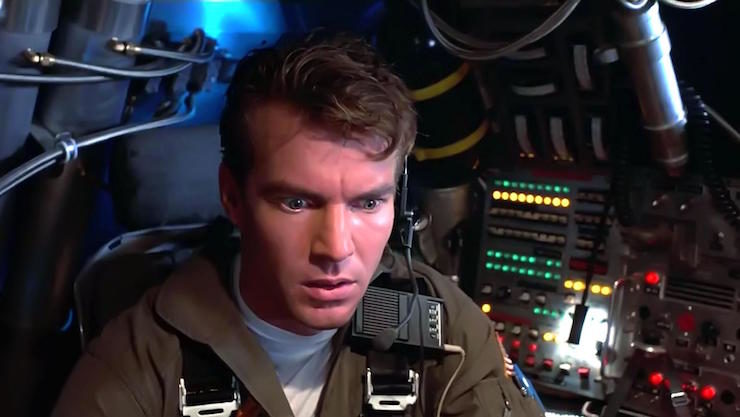
One of my favorite movies. Can’t believe no one has yet to remake it. Can you say Key & Peele?
A. One of my favorite movies.
B. Can’t believe no one has yet to remake it.
One of these things is not like the other…
A lesser film would have had the CIA or Giant Anonymous Enterprises as the enemy, which would have been far less funny.
I like most of Joe Dante’s movies, and this one has a lot of the classic elements that most of them share (including a Goldsmith score and Dante’s repertory company of character actors like Picardo and McCarthy). And Meg Ryan is pretty luminous in this, IIRC. But I’ve never been that much of a Martin Short fan, so I think I would’ve liked it better with a different comic lead.
Fantastic Voyage was not Isaac Asimov’s, by the way. It was an original film written for the screen by Harry Kleiner, adapted (whatever that means) by David Duncan from a story premise by Jerome Bixby and Otto Klement. Asimov just wrote the novelization for the movie, but the book came out first due to production delays on the film, so a lot of people have mistaken the movie for an adaptation of the novel.
@@.-@ It occurs to me that what with advances in medical technology and biology over the past 50 years (along with the changed world geopolitical situation), as well as current CGI and mo-cap filmmaking abilities, that a remake of FANTASTIC VOYAGE could be worthwhile.
@5/Russell H: I think a modern way to do a Fantastic Voyage/Innerspace-like story would be to use telepresence nanobots instead of miniaturization — i.e. what Futurama did in “Parasites Lost.” I’m pretty sure I read a prose story along those lines some years ago and thought that it could make a good movie, but I can’t remember now what the story was or who wrote it. The tricky thing is that if the characters were just operating microscopic robots, they wouldn’t be in much danger, and I’d hate to fall back on the hackneyed “If you die in VR you die in reality” trope.
I like Innerspace. It does age well but Gremlins is still my favorite Joe Dante film. Monster Squad is great fun despite the 80’s slang and you’re right we must never speak of Howard the Duck again.
@7 Never disparage Howard the Duck. I would hate for 13 year old me to have to choose between Meg Ryan and Lea Thompson.
Inner Space was a pretty underappreciated movie for some reason. I think it was just a movie that came out at a weird time. Dennis Quaid and Meg Ryan were pretty popular at the time but Martin Short’s career never really took off at the feature film level. Martin was a good skit comic and stand up but there were much better film comedic leads.
I think Innerspace was underappreciated because, for some reason, people who went to see it thought it would be science fiction, and it was actually a comedy with a SF setting. Maybe they didn’t watch SNL, so they didn’t know who Martin Short was.
Interesting that a few years prior to this Dennis Quaid starred in another inside the human body movie called Dreamscape, though that was of course about dreams and nightmares. It has some nice surreal visuals and Harryhausen-ish effects, but the story comes off like a poor man’s Nightmare on Elm Street for the most part. You’re better off going with Innerspace.
@9/ellsworthj: You mean like those other underappreciated SF comedies Back to the Future, Ghostbusters, and Galaxy Quest? There have been lots of successful SF comedies — indeed, SF/fantasy/horror comedy is pretty much Joe Dante’s primary output (Gremlins, Explorers, The ‘Burbs, Matinee, Small Soldiers).
I liked Dreamscape. It was weird, but interesting, and not a horror movie like Nightmare on Elm Street (which was the only horror movie of that era I liked.)
“Weird Science, a film in which two horny losers build the “perfect” woman, is even more troubling than you remember. “
IIRC (and I may not, it’s been decades) the “perfect woman” ends up in charge…
It is slightly weird that nobody has made a remake or a ripoff of Fantastic Voyage or Inner Space, given the barrel-scraping that’s been going on with remakes recently.
Fantastic movie, but every time I watch it, I just shake my head at what happened to Martin Short. He had a great start on SCTV/SNL, and then a few great movie roles (I love him in Three Amigos even more than this), but then he stopped trying to act and just settled for hamming it up.
Good movie, a lot of fun. Great cast of characters, who were all at their best. I remember it fondly.
Man, this movie completely slipped off of my radar. I loved this as a kid, my brother and I had it in VHS rotation with several other movies that we watched over and over again. I must now go on a mission to find and watch it.